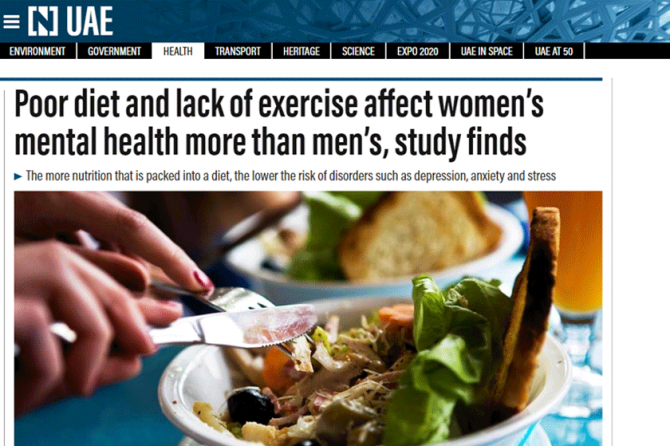
Poor diet and lack of exercise affect women’s mental health more than men’s – Dubai Psychologist, Dr. Fabian, explains the connection in The National
The more nutrition that is packed into a diet, the lower the risk of disorders such as depression, anxiety and stress. Women are more likely to suffer from mental health disorders as a direct impact of poor diet and lack of exercise than men, a new study has found.
When eaten as part of a regular diet, fruits and leafy greens were shown to significantly lift a person’s mood, especially in women.
Researchers at Binghamton University – State University of New York found that the general relationship between eating healthy and exercising led to better mental well-being in women over the age of 30.
The findings suggest the more nutrition that is packed into a diet, the lower the risk of disorders such as depression, anxiety and stress.
Exercise significantly reduced the negative association of high-glycemic food and fast food with mental distress
Lina Begdache, Binghamton University – State University of New York
“Fast food, skipping breakfast, caffeine and high-glycemic (HG) food are all associated with mental distress in mature women,” said Lina Begdache, assistant professor of health and wellness studies at the university.
“Fruits and dark green leafy vegetables are associated with mental well-being.
“The extra information we learned from this study is that exercise significantly reduced the negative association of high-glycemic food and fast food with mental distress.”
The study looked at how customising diet practices impacted mood among men and women, and it showed a significant improvement when positive changes were made to a woman’s lifestyle.
Dr Fabian Saarloos, clinical psychologist at German Neuroscience Centre in Dubai, said the brain was a physical organ and relied on nutrition and adaptation to the environment.
“Diet and exercise, or at least physical movement, are essential in order to supply the brain with chemicals that build up neurotransmitters as well as creating a state and anatomy for the brain to work, and eventually produce all of our experiences,” he told The National.
“A deficit in certain nutrients, such as fats, amino acids, vitamins and minerals leads to imbalances and dysregulation of neurotransmitters and thus unpleasant emotional states like sadness and anxiety.”
He said there was a high correlation between women presenting at the centre with disorders directly related to poor diet and exercise, and poor lifestyle choices were very relevant in conditions such as anxiety and depression.
For the brain to produce more functional experiences it essentially needs to be healthy and well maintained, hence “lifestyle should always be a topic early in mental health consultations”.
“Exercise and diet are important and always discussed [in our consultations], as only an adequate level of overall physical health will lead to better brain functioning, which will thus set the stage for better thinking, more functional emotions, and behaviour change.”
In this latest study, the researchers dissected the different food groups that are associated with mental distress in men and women aged 30 years and older, as well as studied the different dietary patterns in relation to exercise frequency and mental distress.
They found that for unhealthy dietary patterns, the level of mental distress was higher in women than in men, which “confirmed that women are more susceptible to unhealthy eating than men”.
[…]The full and original article was published in The National

